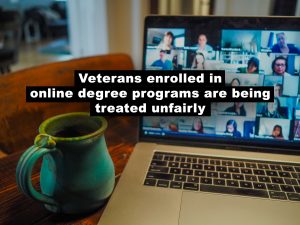The military provides a pretty rigid structure to daily life and despite the bureaucratic mazes of the Department of Defense, you know you can find support or a sympathetic ear around you. Leaving the military can be a different story altogether. The structure and camaraderie are no longer immediately at hand. If you are looking to advance your civilian career through higher education, you will still have to deal with the VA and other bureaucracies, but this time, by yourself.
Veteran students are already more likely to have families and other obligations that make it harder to pursue a degree. Hence, it is a priority to minimize friction and find support where possible. This is why it is important to identify military-friendly colleges. More and more schools are competing for the federal dollars that come from the GI Bill, and some will be less scrupulous about how they draw in Veteran students. That is why we’ve written up a quick guide on how to spot military-friendly colleges.
When applying to a school, check that they have signed the VA Principles of Excellence. This is required of any school that accepts the GI Bill or other federal funding. Relevant schools must adhere to the principles above, including transparency on costs of attendance, advice on how to utilize federal funding, and support for student well-being. These principles were introduced after Veterans of the 9/11 GI Bill became the targets of aggressive marketing from schools that overpromised and under-delivered. Schools that abide by these principles must also permit “short absences due to service obligations” for Veteran students. This is particularly important for students in the National Guard.
Promises and pieces of paper can provide some assurance, but the assurance of legal recourse is little consolation for time and effort wasted. Fortunately, there is a more concrete way to know if a school knows what matters most to Military and Veteran students: see where others have put their faith. The Veteran community has built up a number of organizations and clubs over the years and a military-friendly college will almost certainly be host to one or more of them. In particular, check that your prospective school has a chapter of the Student Veterans of America. A Veteran-friendly organization on campus is a vote of confidence from the wider Veteran community.
It is always important to have a support network, particularly upon leaving the military. Colleges campuses can seem more foreign than the far-away battlefields you fought on. Check that your college has other Veteran clubs and check to see if similar organizations are nearby, such as the American Legion or Veterans of Foreign Wars. It is important to have a space and community of fellow Veterans who have undergone similar experiences and can provide you with the advice you did not even know you needed.
Furthermore, check that your school provides for a full-time Veterans’ counselor. Veterans suffer from far higher rates of mental health problems as compared to the average population. This can be an easy way to keep yourself in check as well as provide you with access to a second opinion rather than relying entirely upon the Department of Veterans Affairs.
Veteran students often aim for practicality and utility. If you are looking to get your degree finished as quickly as possible, you should check whether your school will translate your military experience and training into credit hours. Military-friendly schools will typically be most understanding, but it is advised that you shop around and ask each school how they will transfer your training into college credit. Choosing a program that is related to your MOC will provide you with the most transfer credits.
Finally, it cannot hurt to ask more personal and in-depth questions of any prospective school. Colleges that are sincerely interested in supporting Veterans will often have a liaison who specializes in Veteran issues and will be able to help you find the answers you need so you can know you’ve made the right choice.




